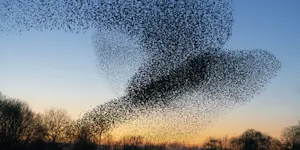What Makes This Word Tick
"Beck" is a charming little word often used to signify a small stream, particularly in northern England. It's the kind of word that brings to mind a quaint countryside scene, complete with babbling brooks and lush greenery. While it's not the most common word in everyday conversation, it holds a special place in the lexicon of nature lovers and those with a fondness for rural beauty.
If Beck Were a Person…
Beck might be that quiet, thoughtful neighbor who enjoys early morning walks in the woods. They’re understated but full of hidden depths, often surprising you with their knowledge of local history and natural features. With a gentle demeanor and an inviting smile, they’re someone you’d love to have on your nature hike or when planning a scenic tour.
How This Word Has Changed Over Time
Originally hailing from Old Norse, "beck" has maintained much of its historical charm and specificity over the centuries. It was introduced into English through Viking influence and has remained particularly rooted in areas once heavily settled by Norsemen, like Yorkshire and Lancashire. Over time, while the world has moved to grander expressions, "beck" remains modest yet evocative.
Old Sayings and Proverbs That Use Beck
While there aren’t many proverbs utilizing "beck," its essence can be felt in phrases that speak to simplicity and tranquility. Imagery of calm, flowing water often symbolizes peace and continuity across cultures, which aligns with what one might associate with "beck."
Surprising Facts About Beck
Did you know that "beck" is still actively used in place-names across England? You'll find it in charming spots like Troutbeck or Levens Beck. Also, its usage isn't limited to England; places in countries like New Zealand and Scandinavia also adopted the word, showcasing its enduring appeal.
Out and About With This Word
Next time you're traveling through rural England or visiting picturesque regions with glacial influences, keep an ear out for “beck.” It may guide you to hidden paths alongside quaint streams where you can lose yourself in the relaxing sound of water over stones.
Pop Culture Moments Where Beck Was Used
Pop culture hasn't widely embraced "beck," possibly overshadowed by more dynamic words. However, there's the musician Beck Hansen, known simply as Beck, whose avant-garde style could metaphorically be the gentle yet persistent stream of creativity, much like a real-life beck.
The Word in Literature
In literature, "beck" might be found in works that celebrate the natural landscape or within regional storytelling that reflects the dialect and unique cultural identity of Northern England. It subtly enriches the setting, offering readers a tactile sense of place.
Moments in History with Beck
Throughout history, notably during Viking invasions, "beck" would have been a common geographical term among settlers in Britain. Though not making headlines, its consistent presence reflects a longstanding appreciation for the landscapes these communities inhabited.
This Word Around the World
While in English "beck" captures a specific kind of watercourse, languages across the globe have their counterparts; for example, "arroyo" in Spanish or "bäck" in Swedish. Each term reflects local geography and culture, though the concept of a small, charming stream is universally appreciated.
Where Does It Come From?
Rooted in Old Norse, "beck" is a testament to the impact of Viking settlers on the English language. Its origin is linked to the Norse term "bekkr," illustrating the linguistic changes as it crossed into English parlance through historical contact and settlement.
How People Misuse This Word
Occasionally, people might use "beck" in contexts unrelated to geography, confusing it with similar-sounding phrases or names. Missteps often occur when it’s mistaken for the verb "beckon," which describes a gesture to call someone over.
Words It’s Often Confused With
Beckon: While "beck" is a noun describing a stream, "beckon" is a verb involving a gesture to call someone.
Beak: Related to birds, a "beak" may be phonetically similar but is entirely different in meaning.
Buck: Similarly short and snappy, but "buck" refers to a male deer or rejecting a trend.
Additional Synonyms and Antonyms
Synonyms for "beck" include rivulet, brook, and streamlet. There aren’t many direct antonyms, but words implying dryness or absence of water, like desert or barren, provide a contrasting idea.
Want to Try It Out in a Sentence?
On our hike, we stopped by a serene beck, where the gentle babbling of water provided a perfect backdrop for a quiet picnic.
















